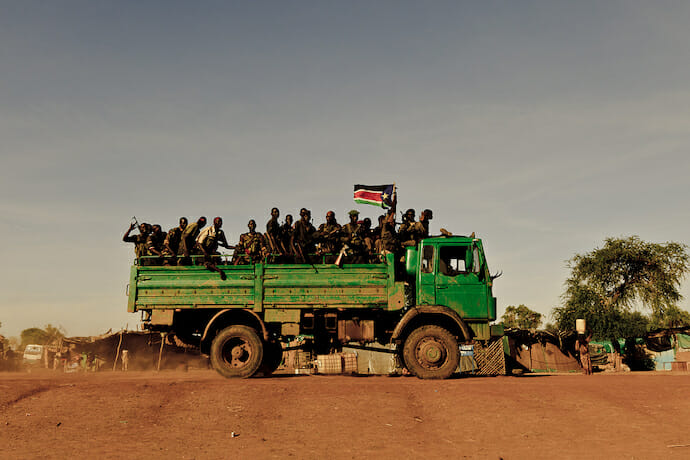
U.S. and Chinese Interests on African Security
There has been intense interest in and outright alarm expressed by western civil society and governments on the rapidly increasing Chinese presence in almost all spheres in African life. Many articles paint a picture of a saintly west and a demonic China in Africa, charging the Chinese on the hearsay evidence of abuse of African workers and poor Chinese workmanship of roads and infrastructure projects.
The Chinese focus on resources and infrastructure and its pragmatic and self-interest motivated policy of non-interference in domestic affairs is paraded as the smoking gun of Chinese responsibility for a range of African ills from unemployment here in Cape Town where I write, to the Darfur genocide. The intense interest by the west in China-Africa relations – arguably a natural development of the globalization process – betrays a deep-seated unease on the part of the west as Chinese companies, government and Chinese models of development are shown to be more adaptable, better liked and more suitable in Africa compared to the western counterparts.
Instead of criticising the Chinese for not acting like westerners or pretending the history of western engagement in Africa was more good than bad; it will be more productive to analyse and understand Beijing’s perspective on Africa and through this identify points of common interest and areas for cooperation. An area of cooperation that is drawing increasing interest in Addis Ababa, Beijing and Washington is African security. Given China’s increasing dependence on African resources and its increasing vested interests in many weak states, it is in Beijing’s interest to cooperate with local, regional, continental and international actors to foster better security in weak African states.
In January of this year, South Sudan shut down its oil productions accusing the North of siphoning oil transiting through it. Under united pressure by Beijing and Washington and negotiated by Thabo Mbeki under the auspices of the African Union High-level panel on Sudan, a formal agreement was signed on the 27 September and oil production is expected to resume in a matter of weeks.
During a trip to Juba in June, I was informed by a Chinese diplomat that while there was a great deal of disagreement between the great powers on the way forward on the current Syrian Crisis, there was consensus that the only way forward for the two Sudans was a negotiated settlement.
It was only with consensus reached by the two ‘superpowers’ in the two Sudans and their united efforts by Washington and Beijing that the oil transit fee impasse between the two Sudans was able to reach such a speedy conclusion. Does the 2012 oil transit fee impasse between the two Sudans offer a model of cooperation for future Sino-US cooperation on security issues in Africa?
The Importance of Africa for the Communist Party of China
As 2,270 delegates gather in Beijing for the 18th communist party congress on 8 November to usher in the new leaders for the next decade, we should realize that Africa is important for the Communist Party of China in two fundamental but related ways. First, as long as the Chinese Communist Party continue to rely for its legitimacy on a sustained rise in prosperity of its subjects, China will continue to need African resources to fuel its economy, and to a lesser extent buy its products.
Africa provides about a third of China’s oil, 90 percent of its cobalt and 35 percent of its manganese and trade between China and Africa has increased from $4 billion in 1996 to over $ 120 billion today. While China constitutes over 13 percent of African’s external trade, it only makes up 4 percent of China’s external trade. Contrary to popular opinion, China provides aid evenly to all African countries that it has ties with and does not provide extra aid to resource-rich countries to lubricate the business process. Secondly, the support of African elites is pivotal for the CPC’s international as well as domestic legitimacy.

Beijing remembers well that it was only able to break Washington’s stranglehold and enter the United Nations because of overwhelming African support in 1971. Again, it was supported by African elites in the post-Tiananmen period that gave Beijing the much needed international space when it faced severe western condemnation and sanctions. The constant stream of African leaders’ expression of support that dominates Chinese domestic headlines further bolsters the CPC’s domestic legitimacy in the eyes of the 1.2 billion subjects. As Beijing continues to negotiate its rise in a US-dominated, unilateral international system it will continue to bandwagon with Africa elites and lobby for a multilateral world order through South-South solidarity initiatives such as the Forum on China-Africa Cooperation (FOCAC) and the BRICS.
Africa in Beijing’s Grand Strategy
Despite of the official Chinese rhetoric of peaceful development and insistence that the Confucian culture is not imperialistic, we should note that as a civilization, China has endured many triumphs and defeats against the Xiongnu, Mongol, Jurchen, Indian, Vietnamese and many other non-Chinese ‘barbarians.’ China has at various times adopted an imperialist policy when it was strong and a policy of using barbarians against barbarians when it was weak. The Great Wall is but one aspect of imperial China’s foreign and security policy and the CPC has inherited the rich diplomatic and historical experience of its forbearers in conducting its foreign and security policy.
The strategy of using barbarians against barbarians is a Chinese equivalent of western balance-of-power diplomacy. It was first employed by the Song dynasty in the 11th century and again in during the late Qing dynasty in the late 19th century after defeats by the British in the Opium War. During both periods, China was faced with a precarious international environment where there were a host of foreign invaders. The tactic is to charm and make peace with different barbarians and to try to cause strife between them, thereby weakening them.
Beijing is carefully managing its relations with the west while at the same time actively charming and cultivating good ties with African elites through a host of aid, exchange programs and investments. Beijing’s charm offensive proved fruitful in both 1971 and 1989 when Beijing was able to use African support to counter Western sanctions and criticisms.
Again, in the case of relations with South Africa, while the CPC had no relations with the African National Congress (ANC) during its Struggle to end Apartheid because the ANC was supported by the Soviet Union, the CPC has quickly built up solid ties with the ANC over the past decade and a half. On the score of building an alliance with the ANC, Thabo Mbeki was able to call on Beijing at the last minute to veto (together with Russia) sanctions against Zimbabwe in 2008. South Africa has been invited to join BRIC despite the relatively small size of its economy. In return, the ANC’s foreign policy discussion document published in March of this year has professed a desire to focus on South-South alliance and the desirability of multipolar world order.
By maintaining good ties with Khartoum Beijing was the only outside power who was able to exercise influence over Khartoum in 2007 and persuade it to accept a UN-AU hybrid force in Darfur. Through its diplomatic maneuverings, China has to strengthen its position in forums like the UN, Arab League, and the African Union.
The credibility China has built up in Sudan and South Sudan means that even though the Government of South Sudan had misgivings about Beijing for its past support for Khartoum’s war machinery, it has quickly recognized it as an indispensable power and peacemaker on the recent oil transit fee impasse between the North and the South. China’s oil investments in the Sudan and South Sudan and the recent demonstration of its diplomatic prowess means that all parties from governments in the region, South African diplomatic staff, to western civil society look to China to play a decisive role in the Sudan – South Sudan conflict.
However, given Beijing’s strategy of using barbarians against barbarians and therefore the need to be everyone’s best friend, we can expect Beijing to make all the right rhetorical noises but play no decisive role as a peacemaker in the region. Beijing prefers a multipolar world order and it will follow and support regional powers to take the lead in a multilateral effort to end the crisis. This was confirmed by Liu Gujin, the Chinese special envoy to Sudan to the assembled scholars at the recent China-Africa Think Tanks Forum held in Ethiopia.
Question of the Two Sudans
Despite the need for oil, Sudan and South Sudan are not indispensable to Beijing and the security issue of the two Sudans does not occupy a place in the centre of Beijing’s core security interests. This is similarly the case for the US. For Beijing, the Darfur issue has been so skilfully attended to by Beijing that it has become the key player that all parties of the recent oil transit fee crisis between Sudan and South Sudan – western aid agencies, Juba, Khartoum, South Africa, and the AU looks to for support. For Beijing, a delicate balance needs to be struck between maintaining good relations with African capitals and with Washington. It is important that Beijing is able to lean on the one or the other at a time of need while at the same time keeping the two sides apart. This is the reason why western aid operations in Africa are continuously frustrated when trying to socialize Beijing to cooperate with their programs.
Does the 2012 oil transit fee impasse between Sudan and South Sudan offered a model for future cooperation between Beijing and Washington? From Beijing’s perspective, both the African Union (AU) and Washington were already in agreement that Juba and Khartoum must come to a negotiated settlement. It was also to its own economic advantage that oil production would resume. Freed from the potential of offending either party, it was natural that Beijing plays the supportive role to Mbeki, cooperate with the US and act as a go-between the different sides. However, this case of cooperation is not likely to be repeated should the AU and Washington disagree.
The Chinese will likely take the side of the AU against the US in cases where there was a difference of opinion. In Libya for example, the AU and NATO held very different perspectives on regime change and Beijing is likely to be supportive of the AU’s stance.
